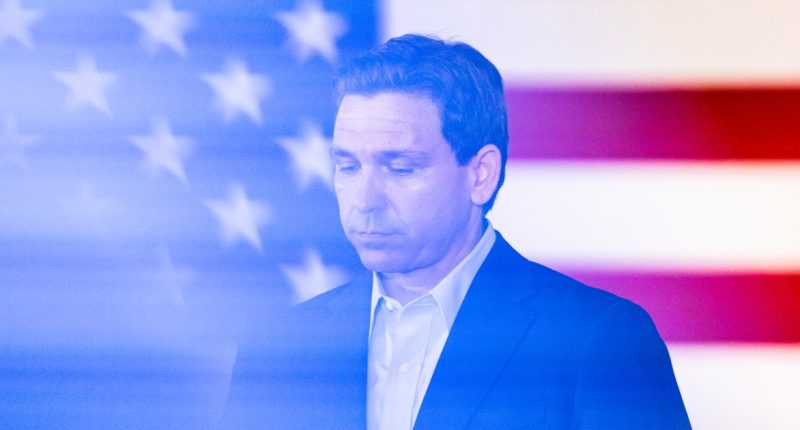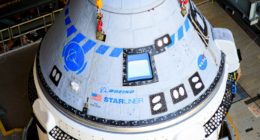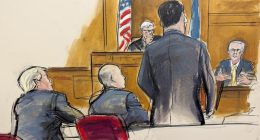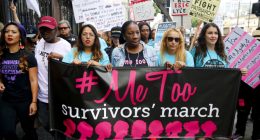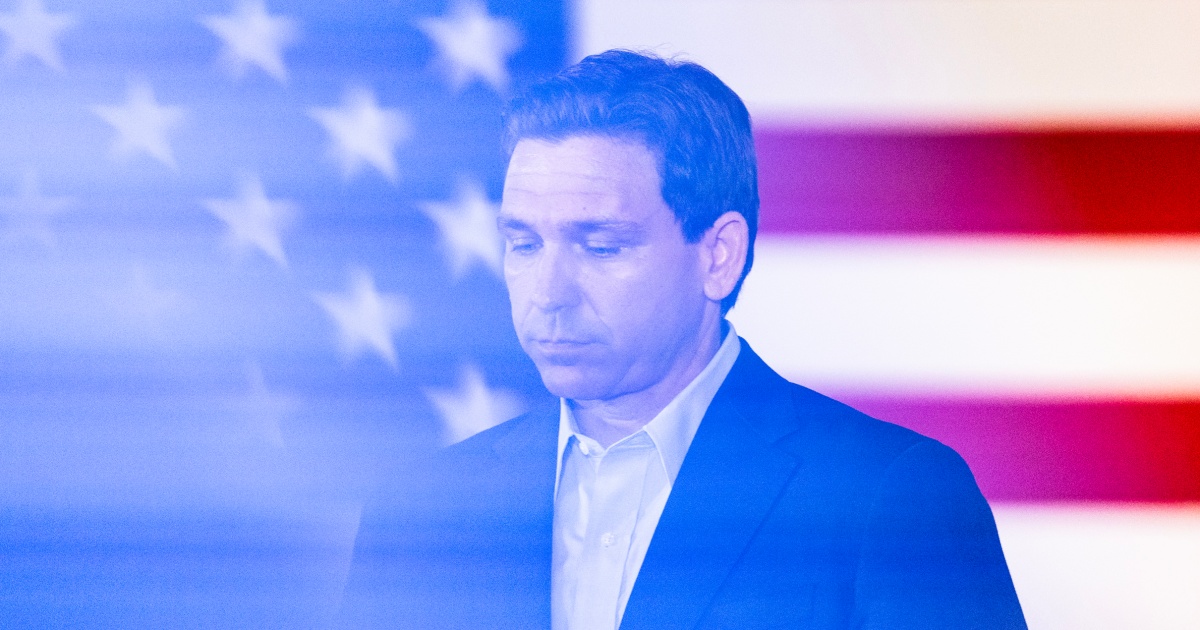
MANCHESTER, N.H. — Florida Gov. Ron DeSantis, once seen as the most formidable opponent to Donald Trump in the Republican presidential primary, suspended his campaign Sunday and endorsed the former president.
The move comes two days before the New Hampshire primary.
DeSantis made the announcement in a video on X — the same social media platform where he did the glitchy rollout of his White House bid.
“Now, following our second-place finish in Iowa, we’ve prayed and deliberated on the way forward,” he said. “If there was anything I could do to produce a favorable outcome, more campaign stops, more interviews, I would do it. But I can’t ask our supporters to volunteer their time and donate their resources. We don’t have a clear path to victory. Accordingly, I am today suspending my campaign.”
“It’s clear to me that a majority of Republican primary voters want to give Donald Trump another chance,” he said, adding: “He has my endorsement because we can’t go back to the old Republican guard of yesteryear, a repackaged form of warmed-over corporatism that Nikki Haley represents.”
Haley reacted to the news from the campaign trail in New Hampshire: “I want to say to Ron, he ran a great race. He’s been a good governor, and we wish him well. Having said that, it’s now one fella and one lady left.”
Since coming in second in Iowa on Monday, DeSantis’ campaign has sent mixed signals to voters, donors and lower-level aides, creating confusion about his intentions for the rest of the campaign.
He went directly to South Carolina from Iowa, a move apparently designed to bolster his insistence that he would stay in the race at least until that state’s late-February primary.
But then he bounced back and forth between South Carolina and New Hampshire, scheduling events in the Granite State with little warning for supporters and undecided voters who wanted to see him before Tuesday’s primary. He also quietly returned to Florida on Thursday with no public explanation as to why.
He canceled appearances on Sunday-morning television programs — including NBC’s “Meet the Press” — late Saturday. The campaign also told surrogates to stand down from planned television appearances Sunday, according to one of the surrogates.
By Sunday morning, advisers and donors said they did not know whether he would drop out — but had begun speculating that he would. A source familiar with DeSantis’ campaign said he made the decision to exit the race Sunday afternoon.
DeSantis’ decision came as a sudden surprise to allies at Never Back Down, the pro-DeSantis super PAC that cannot coordinate with the governor’s campaign. One official with the PAC was New Hampshire-bound for more DeSantis events as the news broke. “Do you think I’d be going there if I thought otherwise?” the official said when asked if they had heard rumblings of a DeSantis dropout.
Trump and his allies began dropping hints that a DeSantis withdrawal was imminent Saturday night, with Trump saying as much at a rally in Manchester.
“We might get Ron DeSantis back onside pretty soon,” Rep. Matt Gaetz, R-Fla., a Trump backer who was close to the governor before the 2024 campaign began, said Sunday.
DeSantis sought to position himself as an alternative to Trump, trying to cast himself as a politically successful heir to the MAGA movement and its preferred policies without Trump’s baggage. But in his bid to court Trump’s supporters, DeSantis was slow to meaningfully criticize the former president and was unable to peel away enough of his support. DeSantis’ embrace of hard-right policies also led moderate Republicans and independents to look elsewhere in their search for a candidate to steer the GOP in a different direction from Trump.
Ultimately, DeSantis was only able to notch a distant second-place finish in the Iowa caucuses.
DeSantis entered the Republican presidential race with an impressive political operation and widespread popularity in the party after achieving a blowout 2022 re-election win in Florida, which had for decades been one of the most tightly divided states in the nation.
But the momentum DeSantis had at the start quickly dissipated after he made his candidacy official, amid relentless attacks from the Trump machine as well as his own missteps. The pro-Trump super PAC, MAGA Inc., spent over $10 million attacking DeSantis before he even announced his candidacy for president, according to campaign finance records.
The early ad campaign slashed at the Florida governor with TV spots criticizing votes he took in Congress on Social Security, Medicare and taxes, and it didn’t let up. MAGA Inc. spent more than $23 million on anti-DeSantis advertising, campaign finance records show — and the super PAC backing former U.N. Ambassador Nikki Haley spent even more hitting DeSantis as they began clashing in Iowa in the fall.
When DeSantis officially launched his White House bid in May, a glitchy Twitter Spaces event with Elon Musk became emblematic of a campaign that was often overshadowed by infighting, financial troubles, and a complicated partnership with the super PAC Never Back Down.
At the core of DeSantis’ campaign message was a pitch to bring his Florida blueprint to the nation. The governor pledged to dismantle the federal government’s “administrative state,” finish the southern border wall, and limit Chinese influence in the United States and abroad.
The firebrand conservative issues that became fixtures of his administration in Florida found their way to the campaign, too. He weaved his signature war on “woke” through several policy proposals, including ending diversity, equity and inclusion programs in the federal government, barring transgender service members from the military, and banning gender-affirming medical care for minors.
As one of the only sitting executives in the race, DeSantis at times flexed the power of his office in Tallahassee in step with his campaign rhetoric. After the Oct. 7 Hamas attacks in Israel, DeSantis mobilized the Florida Department of Emergency Management to organize evacuation flights as the war raged, with those efforts extracting nearly 700 American citizens from the Middle East.
Even before launching his White House bid, DeSantis sent Florida law enforcement and National Guard members to the southern border to support the efforts of Texas officials there. (The state’s governor, Greg Abbott, ultimately endorsed Trump.)
Trump always posed a difficult obstacle for the governor to overcome, particularly at the start of his bid. The two candidates’ trajectories had been entwined for years — Trump had elevated DeSantis’ career with an endorsement that helped rocket the then-congressman to the Republican nomination for governor in Florida in 2018. Yet DeSantis’ presidential aspirations hinged on the prospect of a party ready to ditch their firebrand populist leader.
While Trump’s candidacy was often overshadowed by his legal woes and baggage from his term in office, DeSantis often declined to criticize the front-runner in the early months of his campaign as he sought to win over his voters. In rarer moments, DeSantis generated headlines with comments about Trump’s lackluster response during the Jan. 6, 2021, riot at the Capitol or the political failures of his election denialism.
By the end of his run, DeSantis was regularly attacking Trump in his stump speech, chiding the former president for not following through on 2016 campaign promises like building a border wall, for refusing to join primary debates, and for his handling of the Covid-19 pandemic.
Criticisms notwithstanding, DeSantis said that as president, he would pardon Trump if he were convicted on any of the federal charges he faces.
Meanwhile, the messages of the campaign were often eclipsed by internal personnel and financial struggles on the DeSantis team.
Barely two months into DeSantis’ run, the governor’s campaign ran into financial trouble and fired roughly a dozen midlevel staffers as a cost-cutting measure — and then dismissed nearly two dozen more a week later. Not long after, the governor replaced campaign manager Generra Peck with a longtime loyalist, governor’s office chief of staff James Uthmeier. As financial troubles roiled the campaign, DeSantis leaned heavily on Never Back Down’s support, letting the PAC fund most of the television advertisements and events.
The super PAC also suffered its fair share of internal drama.
A leaked debate strategy memo that suggested DeSantis should defend Trump and attack Vivek Ramaswamy caused headaches for the candidate.
In the weeks leading up to the caucuses, the super PAC lost its CEO, fired his replacement just a few days later, and saw its top strategist resign shortly thereafter. Before the departures, one super PAC meeting over budgeting nearly devolved into a physical confrontation over disagreements about how to handle Haley’s surge in the polls.
Ahead of the first presidential nominating contest in Iowa, the DeSantis campaign, with help from the PAC, built a formidable ground operation in the Hawkeye State, devoting significant time and effort there. The governor visited all of Iowa’s 99 counties, super PAC staff knocked on hundreds of thousands of doors, and the governor scored endorsements from Iowa Gov. Kim Reynolds and the influential evangelical leader Bob Vander Plaats.
In the closing weeks of his campaign, DeSantis not only worked to close the polling gap between himself and the former president, but spent significant time and money to stave off a surging Haley in Iowa. He accused Haley of lacking proper conservative credentials, seizing on missteps like misnaming a University of Iowa basketball star and for saying that the New Hampshire primary serves as a correction to the results of Iowa’s caucuses.
But the traditional Iowa playbook — one that worked for past caucus winners like Ted Cruz — did not prove effective enough against Trump’s pseudo-incumbency and immovable support inside the Republican electorate. DeSantis finished well behind Trump and only barely managed to block Haley from the runner-up spot.
After celebrating a second-place finish as a victory, DeSantis opted to first visit South Carolina instead of making the traditional overnight trip for presidential candidates from Des Moines, Iowa, to Manchester, New Hampshire. The move, DeSantis and his allies hoped, would signal the governor’s campaign was built for the long haul, including into the Super Tuesday elections in March.
Those hopes did not come to fruition.
DeSantis has two years remaining in his second and final term as the governor of Florida.
Source: | This article originally belongs to Nbcnews.com
